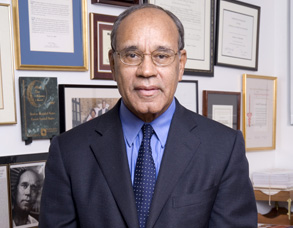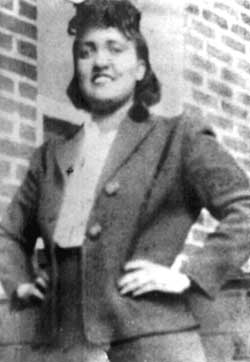Everyone deserves a fair and just opportunity to prevent, detect, treat, and survive cancer. The American Cancer Society and the American Cancer Society Cancer Action Network is celebrating trailblazing Black leaders and pioneers who paralleled this through their critical contributions to cancer research and prevention, health equity, and reducing disparities across the cancer continuum.
Dr. Jane Cooke Wright

Known as the ‘Mother of Chemotherapy,’ Dr. Jane Cooke Wright was a surgeon, cancer researcher, and educator who pioneered the use of chemotherapy drugs as a viable treatment for cancer and helped make the treatment more accessible to cancer patients. Her legacy has not only informed modern standards for clinical oncology and access to cancer care, but also paved the way for the inclusion of a new, diverse generation of researchers and oncologists dedicated to saving more lives from cancer.
As the only woman co-founder of the American Society for Oncology, Dr. Wright’s research led her to be appointed to the National Cancer Advisory Board and the President’s Commission on Heart Disease, Cancer, and Stroke by U.S. President Lyndon B. Johnson.
Dr. Wright served as the head of the Cancer Research Foundation, the director of Cancer Chemotherapy Research at New York University Medical Center and became the first Black woman associate dean of a medical school when she led the Chemotherapy Department at New York Medical College. She was also the first woman president of the New York Cancer Society and served on the Board of Directors of the American Cancer Society of New York.
Dr. LaSalle D. Leffall, Jr.

As the first Black president of the American Cancer Society, Dr. LaSalle D. Leffall, Jr. was a renowned surgeon, oncologist, medical educator, and patient advocate who devoted his life to the study of cancer and how it impacts Black communities. His legacy continues to inform our efforts to advance health equity today and has made a lasting impact on the history of American surgical oncology.
During the civil rights era, Dr. Leffall began volunteering with the American Cancer Society and challenged the organization to focus on disparities between Black and White Americans in cancer prevalence, treatment, and mortality. While ACS president, he introduced a first-of-its-kind program to address the cancer burden among Black Americans, focusing on incidence and mortality.
Dr. Leffall was also the first Black president of several other professional organizations including the Society of Surgical Oncology and the American College of Surgeon, and served as the chairman of Howard University’s Department of Surgery. In addition to his efforts to ensure all cancer patients had access to equitable, quality care, he worked to enhance educational training opportunities for Black medical students and physicians.
Dr. Lori Pierce

Dr. Lori Pierce is a radiation oncologist and professor who has dedicated her career to the treatment of breast cancer patients. As the first Black president of the American Society of Clinical Oncology, she focused on improving equitable cancer care for every patient.
Dr. Pierce was elected to the National Academy of Medicine for her research in developing radiation treatments for breast cancer and her efforts to draw women and people of color into medicine. To improve patient outcomes, Dr. Pierce’s work has addressed barriers to cancer care and the needs of underserved communities, and helped develop recommendations to broaden eligibility for clinical trial participation.
She is currently vice provost for Academic and Faculty affairs at the University of Michigan and director of the Michigan Oncology Quality Consortium.
Dr. Harold P. Freeman

Recognized as the ‘Father of Patient Navigation,’ Dr. Harold P. Freeman is a surgical oncologist and former president of the American Cancer Society whose work has led to advances in the quality of and access to care for cancer patients and increases in cancer screening and earlier detection and treatment of the disease.
Dr. Freeman played a pivotal role in highlighting the connections among race, social determinants of health, and cancer. After observing many Black patients with advanced forms of the disease during his career at the Harlem Hospital Canter, he set out to reduce cancer mortality rates in the Black community. Dr. Freeman created free cancer screening centers in Harlem to help support early detection and later developed a patient navigation program to eliminate barriers to cancer care, which was supported by a grant from the American Cancer Society.
Before retiring, Dr. Freeman’s leadership included serving as chairman of the U.S. President’s Cancer Panel, director of the National Cancer Institute’s Center for Reducing Health Disparities, and founder of the Harold P. Freeman Patient Navigation Institute.
Henrietta Lacks

Henrietta Lacks was a Black woman, wife, and mother who unknowingly changed the face of medicine. After being diagnosed with terminal cervical cancer in 1951, her cells–cultivated without her knowledge or her family’s consent–have been used to develop remarkable medical breakthroughs including treatments for cancer, HIV/AIDS, and Parkinson’s disease for more than six decades.
Named HeLa cells, Henrietta’s cells were a breakthrough as the first immortal line of human cells. HeLa cells are continually used for research and testing of theories about diseases and have been the subject of over 75,000 studies.
Henrietta’s legacy continues to live on through not only her HeLa cells and modern scientific research and advances, but also through informed consent laws that protect research participants, awareness of health equity, and the importance of reducing barriers to care and health disparities worldwide.
Dr. Robert A. Winn

An oncologist and pulmonologist, Dr. Robert A. Winn is committed to research focused on eliminating health disparities. He currently serves as the director of the Virginia Commonwealth University Massey Comprehensive Cancer Center, leading the nation in establishing a 21st-century model for promoting diversity, equity and inclusion in the oncology workforce, optimizing cancer health care outcomes for all, and spearheading interdisciplinary approaches to cancer disparities research.
As the second-ever Black director of a National Cancer Institute-Designated Cancer Center, Dr. Winn’s work has helped empower underserved patient populations, improve health care delivery, and ensure equitable access to cancer care. His community engagement efforts have helped foster new approaches to building trust among communities previously disenfranchised from health care or excluded or abused in research.
Dr. Winn is also president of the Association of American Cancer Institutes and serves on the Boards of the American Cancer Society and the LUNGevity Foundation.



